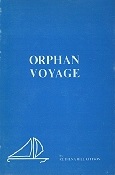
Orphan Voyage
by Ruthena Hill Kittson
Life History Study Center, 1968
Reviewed by Barbara Free, M.A.
At the time she compiled and wrote Orphan Voyage, she had moved to Colorado and was continuing her research and writing, and had begun to explore the possibilities of adopted adults searching for what we now call birth family. She includes excerpts from interviews with adopted adults who had greatly varying stories. One woman, for instance, wrote: “My friend is horrified at my willingness to give any information at all, but then she is quite different. You see, she feels that there is something shameful about being adopted.”
The author states, “Now let us assume there is a certain amount of shame felt by many adopted people. If one may assume this, it can account for their silence, and it thus presents itself as a problem to the researcher. I could have avoided the problem by writing elaborately about my own life, showing how the element of my adoptive status seemed to have colored it. ... Though I felt that an autobiography might be of interest, it would have little influence.”
Some of the people she interviewed for this book had, as adults, found their birth mothers (not a term around yet), and were glad that they did. One said that he felt that a mother always wants to see her child, no matter the circumstances, but may hesitate to interfere. He further said his adoptive parents did not give him any advantages in their home, and told him his mother must not have cared much for him, or she would not have “let you go.” He found quite the opposite, and was even able to find his birth father through his birth mother, and had a good meeting with him, in which his father said he had “taken advantage” of his mother. He had spent ten years finding her.
This book details some of the history of adoption this country, including Charles Loring Brace, who organized many of the orphan trains, in a well-meant attempt to find homes for all the abandoned and/or poverty-stricken children in New York City. He also believed that by giving these children to farm families in the West, they could overcome their “bad heredity.” This belief persisted in adoption agencies and unwed mothers’ homes at least through the 1950s, and is not entirely gone even now in society.
The author discusses the term “illegitimate” and the damage done to children to labeled in that way. She writes, “The unmarried mother is viewed ... in derogatory terms, the illegitimate child must be ‘’chosen” in order to exist, and the adoptive parents do not rate too well, for they must pretend to be other than they are to have any meaning in life.”
She hoped through her research to change these assumptions and attitudes. Although many years have passed since her work, society has made only moderate progress.
Excerpted from the February 2025 edition of the Operation Identity Newsletter
© 2025 Operation Identity